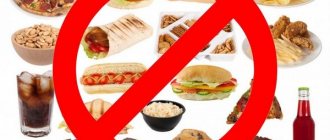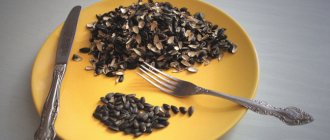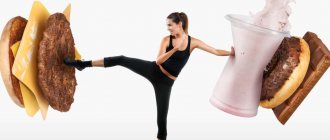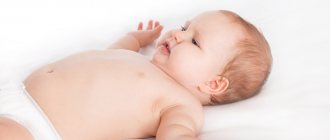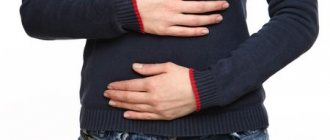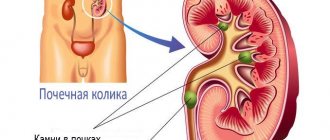Nothing darkens the life of a newborn baby and his parents more than colic, which often bothers the child. Abdominal bloating greatly torments the baby, preventing him from sleeping, eating and exploring the world normally. Parents also suffer along with it, trying to find out the cause of increased gas formation. Previously, scientists believed that a baby’s colic was directly related to the diet of the nursing mother. But is this really so? How do the foods a mother eats affect the process of gas formation in a newborn?
Recent studies have shown that there is no relationship between the diet of a nursing mother and colic in the baby. However, scientists' opinions on this issue are divided. Rather, it is due to the individual intolerance of mother and baby. After all, in this case we are talking only about food preferences.
Basic principles of menu planning for breastfeeding
Let's consider what a nursing mother needs to know. For high-quality and long-term breastfeeding you need:
- Drink enough liquid: clean water without gases, green tea or a weak black drink, compotes, fruit drinks. The daily volume is at least 1.5-2 liters. A warm drink is recommended 30 minutes before feeding to stimulate milk flow.
- The menu includes lean meats, grains, vegetables and fruits.
- Exclude foods that are obligate allergens, that is, known to cause allergies: citrus fruits, chocolate, red fruits and berries, honey, nuts, river fish.
- Avoid taking whole milk in the first months. It causes allergies and intolerances. Therefore, milk must be boiled for 30-40 minutes so that the milk sugar is destroyed. Include fermented milk products in the diet: kefir, cottage cheese, yogurt, fermented baked milk.
- Be careful when eating foods that cause colic and flatulence in mother and child (see below).
- Increase caloric intake by 300-500 kcal.
- Eat food more often, but in smaller portions, 5-6 times a day.
- Introduce each new product gradually, taking a break in its use for 1-2 days to look at the child’s reaction, the condition of the skin, and intestinal function.
Why does women experience bloating after a caesarean section?
In addition to uterine contractions, after surgery, women feel a raw pain in the suture area. Gases that appear as a result of the administration of anesthesia and the use of painkillers also cause considerable discomfort. It will take some time to improve the functioning of the intestines and get rid of gases. To do this, you need to adhere to the regime and eat rationally.
The first meal after cesarean section is allowed no earlier than 24 hours later. The main part of the diet is liquid and crushed foods. To improve intestinal motility, you should move, since in this situation bed rest is not beneficial.
What a nursing mother should not do
If the baby is breastfed, the mother needs to know what foods to include in the diet and what not. When visiting a child for the first time, the pediatrician usually talks about what causes colic during breastfeeding . The list of undesirable products looks like this:
- whole cow's milk;
- fiber in fresh vegetables and fruits, such as white cabbage, beets, carrots. Allowed after heat treatment.
- legumes cause flatulence.
- dried apricots, apricots, baked potatoes in their skins - contain a high concentration of the microelement potassium, which promotes bloating.
- bread - contains yeast, causes fermentation. Replaced with bread.
- fruits on a full stomach also cause fermentation, it is better to eat before or between meals or use as a snack.
- desserts with cream, rich bakery products, and sweets also lead to fermentation. You can eat halva and pastila.
A nursing mother can easily replace all products recommended for use during breastfeeding with approved analogues.
Causes of increased gas formation after childbirth
Due to pressure from the uterus, organs become displaced during pregnancy. It will take a couple of months for them to return to their places after childbirth, and until then, bloating often worries women in labor. In case of delivery with the help of auxiliary means, the recovery process will be delayed. Other reasons for increased gas formation should be noted:
- errors in nutrition;
- disturbance of peristalsis of the gastrointestinal tract after cesarean section;
- the formation of adhesions between the peritoneal organs and intestinal loops as a result of surgery;
- anesthesia and painkillers;
- lack of movement after childbirth or caesarean section;
- insufficient fluid intake.
If you eat a forbidden food
It so happened that my mother violated her diet. Nothing bad will happen. And it may not affect the child’s condition in any way. If the errors are large, the mother consumed huge portions of forbidden foods at a dinner party, then you should not put the baby to the breast for as long as possible or feed him from non-sucking objects with previously expressed milk, if available.
How to help a baby
The child is worried, sleeps poorly, cries. The baby needs help to pass gas as quickly as possible. Common first aid for colic:
- Place on stomach between feedings. This simple technique not only helps in an unpleasant situation, but also contributes to the development of the baby.
- Hot diaper. Iron the quarter folded diaper with a hot iron and apply it to the tummy.
- Massage. With a warm hand, make stroking movements clockwise around the navel. Bend your legs towards your stomach.
- Hold the baby close to the mother's belly. He feels the warmth of his mother, the smell of milk, the heartbeat and calms down.
- If this does not help, give a warm drink: dill water, special children's herbal teas based on dill, fennel, anise, chamomile. Medicinal plants have an antispasmodic effect, accelerate intestinal motility, reduce pain and stimulate the passage of gases. They are sold in pharmacies or specialized stores and are allowed from birth.
If colic does not go away
If a set of measures is ineffective, prolonged crying, refusal to eat, sleep disturbances, and general condition persist, then this is a reason to consult a doctor. Only he prescribes drugs after assessing the condition of the little patient and making a diagnosis (below is a review of popular anti-colic drugs for children). However, it is worth remembering that colic is not a disease; it does not in any way affect the child’s general condition, appetite, or motor activity.
How to alleviate a child’s condition with flatulence?
In addition to eliminating harmful and prohibited foods from the diet, your baby can be helped by the following methods:
- Massage the baby's belly clockwise in a gentle circular motion. Mom's nails should be cut short, and the skin can be moisturized with special baby massage oil.
- Correctly attach the baby to the breast during feeding (the areola should be almost completely captured by the baby, the nipple should point upward).
- Immediately after eating, the child must be held in an upright position - this will facilitate the exit of gases swallowed with milk from the stomach.
- For particularly severe colic, applying a warm heating pad or an iron-warmed diaper to the tummy of a crying baby will be effective.
- Every day for 3 - 5 minutes it is necessary to lay the baby on its stomach. At the same time, you need to keep an eye on the child: he can bury his nose in the bed and suffocate!
- If attacks of flatulence occur to a child too often, it is necessary to contact a pediatrician who will select the appropriate drug to alleviate the condition (Espumizan, Bobotik).
Review of drugs for intestinal colic
Currently, pharmacies offer a variety of medications for colic in newborns. They are divided into those containing natural components and preparations of chemical origin. They have a different mechanism of action, but in the end they all contribute to the release of gases and the reduction of pain.
Espumisan
A chemical that reduces the surface tension of bubbles in the intestines, thereby reducing gas formation. Allowed from 1 month of life. Taken orally before or after meals, diluted in water.
Bobotik
The chemical drug has the same active ingredient as Espumisan. Reduces gas formation, prescribed for flatulence and colic. Taken orally between feedings, mixed with water and given in a bottle.
Plantex
A natural preparation containing fennel fruits and essential oils. It has an antispasmodic effect - relaxes the smooth muscles of the intestines, reducing pain. Improves digestion, increases the production of digestive enzymes, reduces gas formation. Prescribed from 2 weeks of age, the powder is diluted in boiled water, given from a spoon or in a bottle.
Compliance with the mother's diet, massage, medications that reduce gas formation, patience and time will help reduce the manifestations of colic. By 5-6 months of a child’s life, such unpleasant symptoms, as a rule, disappear.
Normal or pathological?
If the woman in labor has no complications, increased gas formation after childbirth will go away within a couple of weeks. Bloating that does not go away with strict adherence to the diet is a reason to contact a gastroenterologist. Flatulence is a consequence of pathology of the digestive tract.
Diagnosis includes ultrasound of the peritoneum and a number of tests. Gas formation may indicate one of the following diseases:
- inflammation of the gastrointestinal tract;
- dysbacteriosis;
- adhesions;
- infection;
- inflammatory process;
- helminths;
- stress or psychosomatic disorder.
What foods should not be included in your diet?
Any food that a nursing mother eats and processes in the body necessarily passes into breast milk. A woman needs to pay especially close attention to her diet in the first 3 months of a child’s life, when the child’s gastrointestinal tract is adapting to new conditions. During this period, the diet for colic in a newborn must be treated with full responsibility.
Foods that can cause tummy problems in a child include:
- condensed milk, milk and ice cream;
- wheat, oats, barley and rye due to their gluten content;
- citrus fruits and juices;
- soy, eggs, peanuts and seafood in large quantities.
The nutrition of a nursing mother should be correct and balanced. Foods that cause increased gas formation are excluded from the diet. These include raw vegetables, legumes, fresh baked goods, raisins and grapes. They can lead to colic, cramps and bloating.
Also, coffee, chocolate, spices, black bread, smoked meats, spicy foods and vegetables (pumpkin, tomatoes) are completely excluded from the diet.
What to do
If your baby has an attack of colic, take the baby in your arms and press his tummy to your chest to warm him up. Talk to the baby, your support is important to him. Apply a warm compress using an ironed diaper. Change the baby's position, unwrap him, turn him on his side. To alleviate the condition of the baby, you can use mechanical devices - a gas outlet tube and an enema.
To prevent colic, give your baby special fennel-based tea or dill water during the day between feedings. Such products will be useful not only for the baby, but also for the nursing mother. You can also brew yourself tea with cumin, lemon balm or anise, all of these substances help reduce gas formation in the intestines.
Buy herbal preparations at the pharmacy that contain fennel oil: Bebinos, Bebicalm and others. Such drugs have a good antispasmodic and carminative effect.
Consult your pediatrician. Your doctor may prescribe medications based on simethicone. This substance helps to destroy gas bubbles and makes it difficult for them to form further. The most well-known products from this group are Espumisan and Sab Simplex. The doctor may suspect lactose intolerance. In this case, enzyme preparations such as Lactazar will help.
Follow our recommendations to prevent tummy problems in your baby. Be patient and be sure to help your child during painful attacks of intestinal colic. In cases where colic is accompanied by abnormal bowel movements, severe crying, and other unusual symptoms, be sure to consult a pediatrician.
Causes of bloating during lactation
Feeding a child in itself does not cause gastrointestinal problems.
However, women who choose breastfeeding (BF) often suffer from bloating. The main cause of the pathology is poor nutrition. Some products enhance fermentation processes in the intestines. As a result, there is increased formation of gases and, as a result, bloating. Dangerous products are considered:
- peas;
- soy;
- beans;
- radish;
- cabbage;
- radish;
- grape;
- yeast products.
It is undesirable to consume milk and other products based on it. They contain sugar - lactose. In the absence of the required amount of enzymes that process lactose, flatulence may occur.
The most common cause of bloating is drinking carbonated drinks. They are prohibited during lactation.
The danger of eating these products is associated with the appearance of bloating not only in the nursing mother, but also in the child. Therefore, following a diet during breastfeeding is especially important.
When is it necessary to see a doctor?
Due to lack of time, women experiment and independently buy medications against increased gas formation. The risk is not justified - the medicine against flatulence must be approved by a doctor, otherwise it can harm the baby. The specialist will select the drug not only taking into account breastfeeding, but will also take into account the causes of gas formation: dysbacteriosis, exacerbation of stomach diseases or lack of enzymes.
You should see a doctor if a woman has a fever, nausea, stomach pain, or fecal incontinence after giving birth. The latter indicates weak muscle tone of the sphincter, and if the problem is ignored, complete muscle atrophy is possible.
Loading…
Share with friends!
Colic: what is it and why does it occur?
The term "colic" refers to pain in the colon. In infants, it manifests itself as sudden, sharp crying. It is impossible to calm a child by rocking him or her to the breast. Characterized by sudden movements of the arms, arching, pressing of the legs due to a spasm in the abdomen. You feel rumbling in your stomach and gas formation. The child blushes and groans. The crying ends as suddenly as it begins.
Features of the malaise:
- appear in the first 3 weeks of life;
- last from 3 hours a day;
- manifestations are present for at least 3 weeks;
- ends by 3 months;
- most often occur in the evening, before bedtime.
But at the same time, the child gains weight, develops mentally and physically correctly, without deviations. The malaise does not require treatment and goes away on its own, often by 3-4 months.
There is still no exact explanation for the causes of colic. It is believed that the disease is associated with the immaturity of the newborn’s intestines, the process of its ripening in the first year of life.
There is no reliable reason for the appearance of colic. There are several opinions:
- immaturity of the digestive and intestinal organs;
- allergy;
- swallowing excess air during feeding;
- long stay in a horizontal position;
- overfeeding the child;
- congenital lactose intolerance;
- dysbacteriosis;
- period of adaptation to the external environment;
- psychosocial problems of the mother, affecting the condition of the baby;
- immaturity of the nervous system;
- improper nutrition of a nursing mother.
Each of the options does not stand up to criticism. But special attention is paid to the nutrition of a woman who has given birth, because substances from foods consumed by the mother enter the milk, causing the accumulation of gas in the intestines and colic. Knowing which foods cause colic in newborns while breastfeeding, a woman will be able to properly organize her diet.
Colic during mixed feeding
If it is impossible to breastfeed the baby only, infant formula is used. Feeding can be mixed or completely artificial. In this case, colic is not excluded, but occurs even more often than with natural feeding.
Causes:
- unsuitable formula;
- incorrect structure of the bottle nipple;
- swallowing excess air during feeding;
- lactose intolerance.
If you are intolerant to milk protein, switch to a dairy-free formula based on soy products. It is important to choose the right orthodontic pacifier with an anti-vacuum system. This will avoid excess air swallowing. Proper organization of mixed nutrition will reduce problems with digestion and absorption of food. The child will become calmer.
When will baby's colic go away?
You can help a child who is unwell with special medications that eliminate excess air in the intestines, bloating and gases.
There are a number of techniques to alleviate the condition of a baby:
- abdominal massage;
- a warm diaper on the stomach or a heating pad;
- dill decoction;
- gas outlet pipe;
- bottles with anti-colic nipples;
- laying on the stomach before eating.
From the moment your baby was born, you are in seventh heaven, holding your baby in your arms. It seems that nothing can overshadow this state and unsettle you. But everything changes when babies begin to experience colic. Komarovsky describes this condition in detail, talks about its symptoms and causes, and also gives quite useful tips in the fight against this disease.
At the moment when your child cries from a pain in the tummy, it seems that the whole world around is collapsing and it will never end. Don't despair and give up. The child needs a calm mother who can help him cope with his troubling condition.
Quite a few moms and dads are concerned about their baby's painful gas, but there's no need to worry too much about it. All children experience this condition and it does not harm them in any way. In the future, they won’t even remember that something like this ever happened to them.
Mothers believe that this is the most terrible and terrible period in their lives, when the child cries angrily, but cannot be helped. It would be correct to assure that in the future you will experience more unpleasant and alarming conditions than ordinary colic.
Pain in small tummies usually goes away by 3-4 months. In extreme cases, they can disturb for up to 5 months. It is by this time that the baby’s digestive system has already established normal functioning, and the intestines are populated with beneficial bacteria and microorganisms.
Proper nutrition for the mother is the key to the well-being of the child. But be careful - even the most harmless foods can cause unwanted reactions in the first months of life. There are other recommendations:
- Place your baby correctly - he should grasp the nipple so as not to swallow air.
- Change the formula or make sure your baby doesn't overeat. Incorrectly selected artificial nutrition and gluttony are also risk factors.
- Place a warm diaper on your tummy - it will warm the sore spot and make you feel better. The fabric should not be hot.
- For prevention, place the baby on his stomach for a couple of minutes before each feeding, and hold him upright after eating.
- A light massage is also a good remedy for gas. Move clockwise, the movements should be circular and light. Perform a set of gymnastic exercises - place the child on his back, begin to straighten and bend his legs.
- Dill water soothes the stomach, normalizes digestion, and is useful for lactation. Buy a ready-made pharmacy decoction or make it yourself from dry seeds in a water bath.
There is no need to buy medications - start with diet correction and other simple methods described in the article. Use only those medications prescribed by your doctor.
Colic bothers most newborns and goes away on its own by 3-6 months. The main reason for their appearance is the malnutrition of the nursing mother. Also make sure that the baby takes the breast as needed, that the formula is suitable for him, and that there is no overeating. Medicines are usually not required.
If a child has flatulence, it is necessary to review his mother's menu. A direct connection between the composition of breast milk and a woman’s nutrition has been scientifically proven. If a mother eats foods that cause her severe gas, the child will also suffer from abdominal pain. So, during the period of breastfeeding (at least for the first 3 months, after which prohibited foods can be introduced in small doses), a woman is prohibited from eating a number of foods:
- Whole milk can cause lactose allergy. It is undoubtedly possible and necessary to eat fermented milk products; it is better to exclude milk completely.
- Rye (black) bread can be replaced with whole grain diet bread - they contain the same amount of vitamins and minerals, but much less fiber, which causes gas formation.
- Legumes (corn, peas, beans, chickpeas) are a source of vegetable protein. However, during lactation it is necessary to abandon them. Peas and corn can be replaced with soy cheese.
- Fresh, pickled and canned vegetables and fruits. Such products are allowed to be boiled and baked. The lack of vitamins is compensated with the help of vitamin complexes.
- White cabbage.
- Yeast dough can cause severe flatulence in a baby, so you should not get carried away with pies during breastfeeding.
- Mushrooms are a source of protein, but they are very difficult for the body to digest and are highly likely to cause flatulence in both mother and child. It is not recommended to eat them until the end of lactation.
How to get rid of bloating without drugs
The best solution for bloating is to adjust your diet. A nursing mother must avoid not only potential allergens, but also foods that provoke fermentation.
The basis of a woman’s diet during lactation should be meat. These can be lean varieties of pork or veal. Turkey meat is ideal. If the baby does not have allergies, it is allowed to eat white fish.
Any vegetables are suitable as side dishes, with the exception of cruciferous vegetables and legumes. A nursing mother can safely eat zucchini or potatoes. Cereals are also useful.
The cause of flatulence may be a violation of the microflora. Fermented milk products are especially useful for dysbacteriosis. They can be used with virtually no restrictions.
You can treat flatulence with diet, but certain nutritional rules must be followed regularly. It is important to monitor the amount of food in each serving. Flatulence is often caused by overeating.
Basic principles of nutrition
It is necessary to follow a diet for nursing mothers with colic in a newborn, especially if there are problems with the abdomen. The basic principles of nutrition are:
- To prevent the baby from feeling oversaturated and having problems digesting milk, the mother needs to count calories. The nutritional value of the diet should be 3,500 kcal. The menu should not be overloaded with fatty, salty, spicy dishes.
- The diet should contain a sufficient amount of liquid. It is best to drink water, unsweetened and weak green or black tea, juices, compotes. Milk will not be able to replenish the lack of fluid.
- The menu should include lean meat. It should be steamed or baked.
- The diet should not contain foods that contribute to increased gas formation.
Over time, the menu can be supplemented with a variety of dishes, but until 3 months, it is best for a nursing mother to follow a diet for colic in newborns. In the subsequent period, when introducing a new product, it is necessary to monitor the child’s condition. If it does not change, you can continue to use it.
Symptoms
Many mothers ask: how to determine colic in a baby? Believe me, you definitely won't miss them. But nevertheless, there are a number of signs that indicate that your baby is worried about colic.
- Unexpected restless behavior of the baby. When just a few minutes ago everything was wonderful and nothing bothered him.
- When crying and restless, the newborn pulls his legs towards his small tummy or vigorously jerks them. This means that cutting, unbearable pain occurs in the baby’s intestines and stomach.
- As a rule, increased gas formation in children begins to gain strength in the late afternoon. If your joyful and smiling baby has been screaming angrily for several evenings in a row, then perhaps he has colic.
- While crying, the baby emits gases, which brings him temporary relief and he calms down.
- The most common restless behavior occurs some time after feeding.
- Malfunction of the intestines, which is expressed by frequent diarrhea or constipation.
How to determine that a child has increased accumulation of gases and air in the intestines?
- The baby is nervous and behaves restlessly for no apparent reason (no fever, just ate, diaper is clean).
- The child presses his knees to his stomach, cries and cannot calm down.
- Cries and screams in the evening and at night, although he ate and slept well during the day and morning.
- It loudly emits gases with an unpleasant odor, after which it calms down for a while.
- The child turned pale.
- The baby begins to worry and cry 5 to 10 minutes after eating.
- Constipation or loose, greenish stools.
